#by playing with the same roles and rules of repression!
Explore tagged Tumblr posts
Note
To me, Machete kind of has the energy of a secondary villain/coldhearted side character in someone else's story that a lot of fans latch onto, moreso than the protagonist. Question is, would he be the villain in anyone's story?
Why, thank you! I'm actually glad to hear he gives off that vibe. I don't think he set out to become a villain but a lot of people certainly view him as one.
#in the 16th century canon he starts out as an introverted but sincerely well meaning guy that never quite manages to find his social niche#he was a sensitive kid and when subjected to enough pressure#his insecurity fearfulness and powerlessness mutate into distrust resentment aggression suffocating repression and self-restraint#I don't think he's a bad person in fact he consistently tries very hard to do the right thing#do his job properly avoid letting people down and get through life with a sense of dignity#but he is supposed to come across kind of cold impersonable and difficult to be around if you don't know him personally (and very few do)#people can sense there's something wrong with him and are put off by it#Vatican is a nest of vipers and as the stakes rise he retreats deeper into his coldblooded untouchable work persona#he has no choice but to start lying scheming blackmailing and eliminating his enemies#in order to maintain his position keep Vasco safe their relationship under wraps and his own head above water#essentially playing by the same rules everyone else in the holy see has been playing with for centuries#eventually he loses his spot as the secretary of state and is manipulated/forced to take on a role in the roman inquisition#and if people were sort of iffy about him before being the authority overseeing trials torture excommunications and executions doesn't help#and since he has so few allies and such an infamous reputation he's an easy target for scapegoating whenever necessary#towards the end it dawns on him that he's become the kind of twisted cruel corrupt person he used to fear and despise#and the guilt moral injury and abject self-loathing had largely sapped him of his will to live by the time the final assassin gets him#answered#anonymous#Machete#Vaschete lore#he thought his dream of priesthood would make him a better person more worthy of admiration safety and love but he climbed too high#and got roped up in the dangerous games that take place under god's nose and slowly got strangled to death
368 notes
·
View notes
Text
Kabushuro
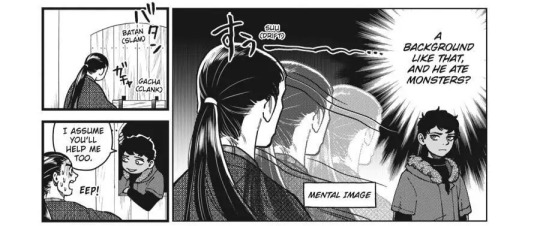

Kabru can fix Shuro I think. It’s cute how surprisingly similar they are...
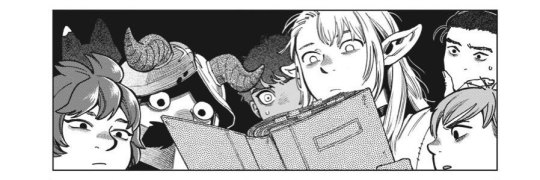
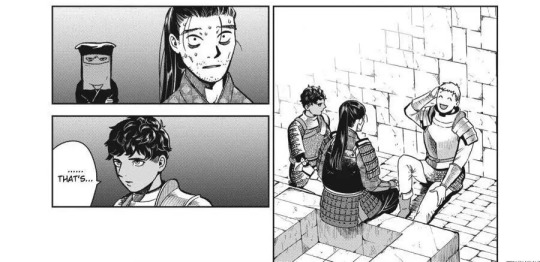
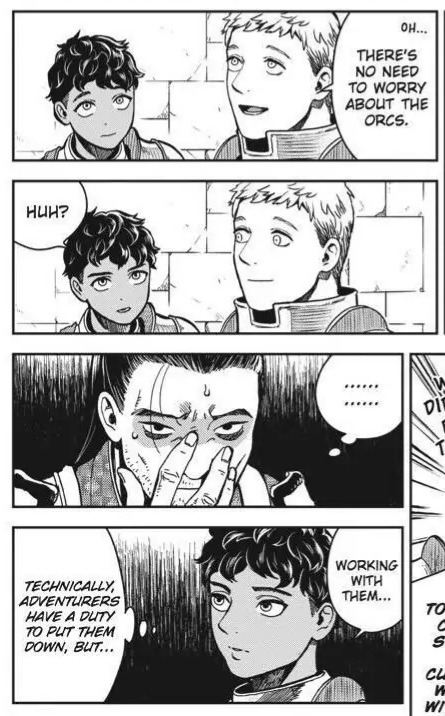
Okay so they're a "we have similar issues" type of duo and the key word is performance.
1) They both treat socializing as a battleground, as a scripted dance there are right and wrong ways to act in, Kabru uses words and social relations as his weapon, especially as someone who was always disempowered otherwise in his life, and Toshiro from his noble background was raised in a very strict stifling way where rules, hierarchy and the importance of social cues were drilled into him. To kabru, being liked was what got him and continues to get him shelter at the island (his landlord even cleans his room for him) and what got and continues to get people to listen to him. To Toshiro, a right conduct is what gets him approval and what upholds the honor of not only him but his entire family and household, it's not just pressure but also his way to feel loved- which never worked with his dad. Kabru's dad left his mother when Kabru was born and Toshiro's father would never take interest in his sons, nothing they could do was grand and impressive enough, preferring instead to travel and horse around despite being a man of great import and military achievements. Community & social success are very important to Kabru and duty and societal approval are very important to Toshiro. Toshiro wants to fit into the expectations placed upon him and Kabru wants to wield social approval to better turn around and change these expectations and that pressure, work towards a society with less need to conform where more people can come to and find a safe home. Toshiro almost dreads his future role, while power couldn't come to Kabru fast enough.
2) They both repress themselves. While Kabru is a malleable tool to even himself, Toshiro's identity and demeanor is rigid, it's just not his own- but something he thought he had to replicate. They both suppress their true selves and their feelings to be more pleasing to the people around them and society and leave very little time for self-care. Neither have people they can truly be themselves with, Kabru not wanting to be vulnerable with anyone even his childhood friend Rin who went through similar trauma, and Toshiro having to be the honorable heir with everyone he interacts with, even feeling like he was betrayed by his mother figure Maizuru he loved when it turned out she also bent her spine for his (in his opinion) good-for-nothing father- he's constantly shadowed by his bodyguards, constantly monitored!!
Like the thing that gives them stress and that gives them validation is sorta the same (achievements & family expectations, understanding and playing people to get to goals) and like……………. Idk
They’re like. Parrot vs parakeet… They share the same cage and Kabru parrot is singing and playing with the enrichment puzzle toys and doing little dances meanwhile Toshiro is huddled in the corner quiet in a ball. Birds are stressed smart animals lol this makes sense to me.
Sooo they're both repressed guys who approach social relationships with a facade and hold the community & world's wellbeing above their own. They do have a lot of differences as well though, like how Kabru is so much more active than passive and paves his own path, meanwhile Toshiro has a hard time leading and tries much more to stay confined in the rigid structure of his life- again being malleable and adaptable vs rigid to a fault. They're both STRESSED and they both hate OPENING UP!
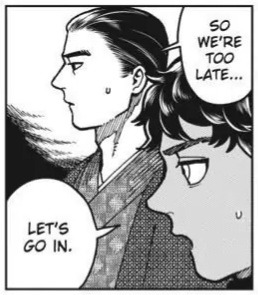
We see Kabru get Toshiro out of his shell a bit :) Though pushing Toshiro to be more active is something we see a couple people do in general, like how Namari dragged him into the "Asivia is causing problems in the party" pre-canon Laios party conversation. But where does this even go from there I hear you ask.
Well thankfully for us, Kabru likes figuring out people and Toshiro does crave some connection, as seen with Falin. Toshiro meeting someone not from the East who is still familiar with eastern customs (okonomiyaki for example), not enough to criticize Toshiro for doing things wrong but enough that Toshiro can relax around him. Knowing his intents get across. It’d be relaxing for Toshiro for sure to be around someone who like, gets social cues almost effortlessly. Kabru would seem to always read him so well even when he can’t express how he’s feeling and, even though it’d also be a bit (lot) scary in a feeling naked and you can’t hide anything from him way, it’d be soothing to know that literally like, that he doesn’t have to put up a front yes (because it'd be useless, Kabru sees A L L)- but also that he doesn’t have to even really communicate verbally almost, which he finds somewhat hard to do. They do still communicate very easily together though! Toshiro is good at picking up on things so he's not oblivious to Kabru's scheming and shrewdness, which makes their relationship easier to both work and be healthy imo.
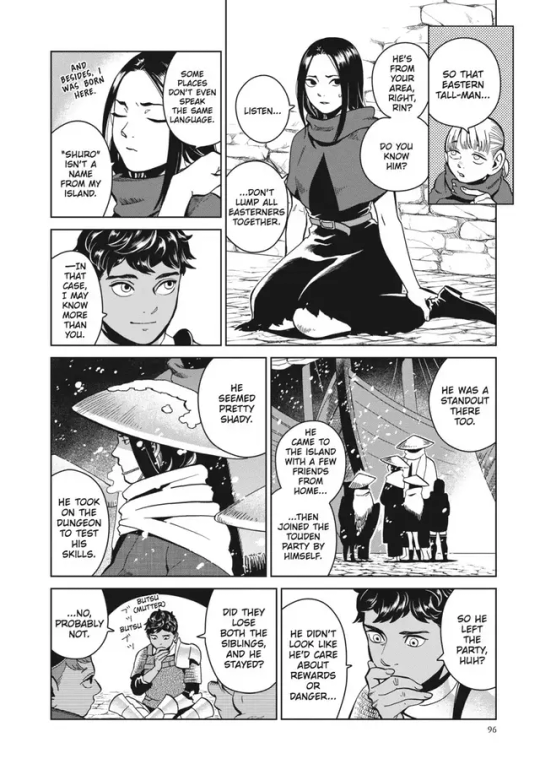
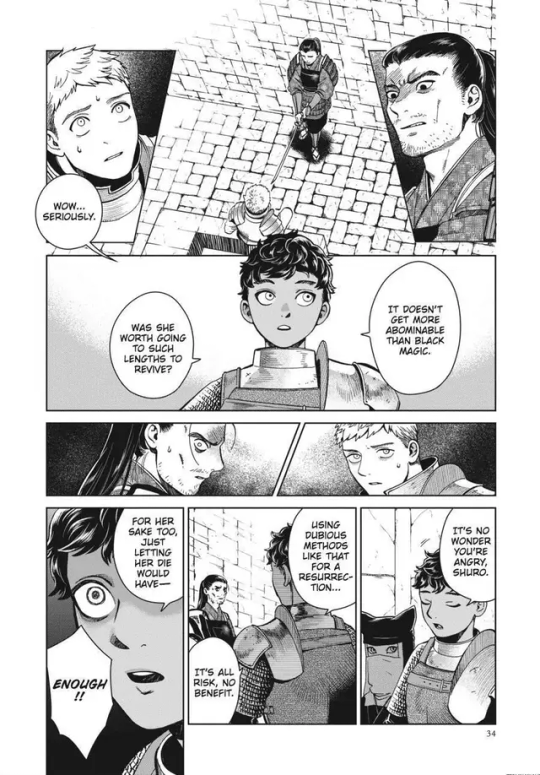
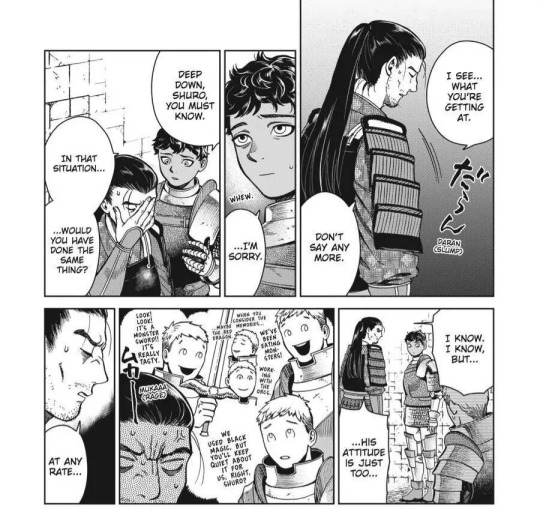
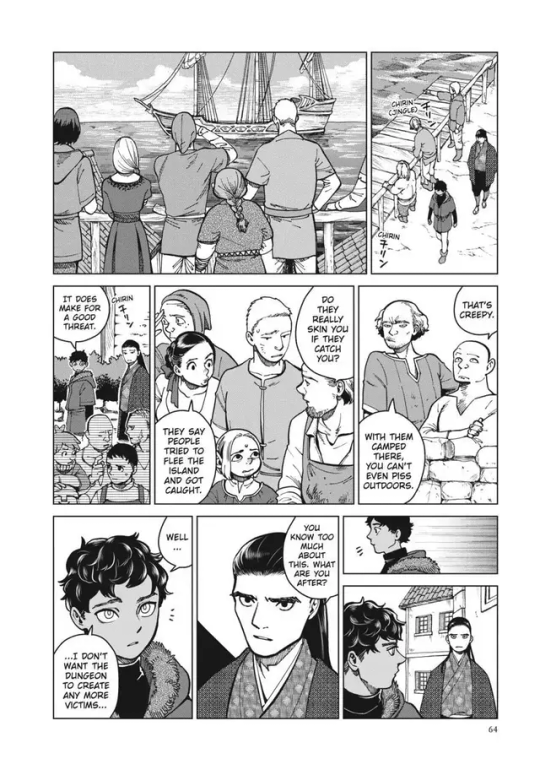
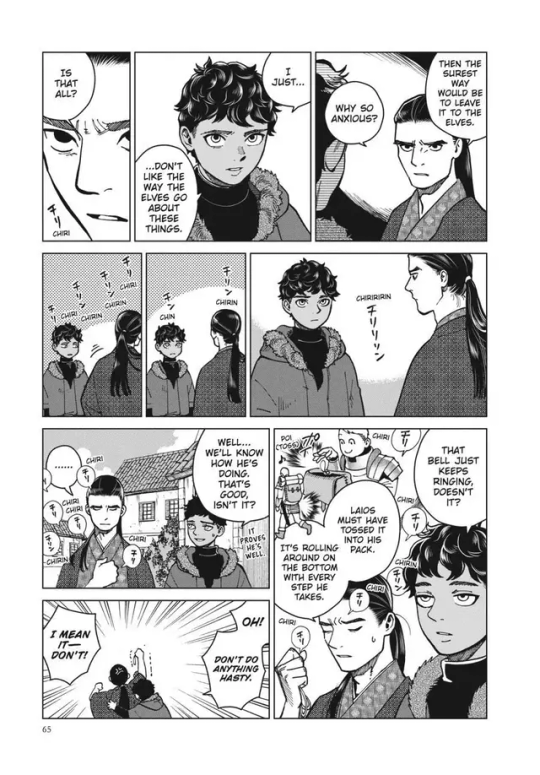
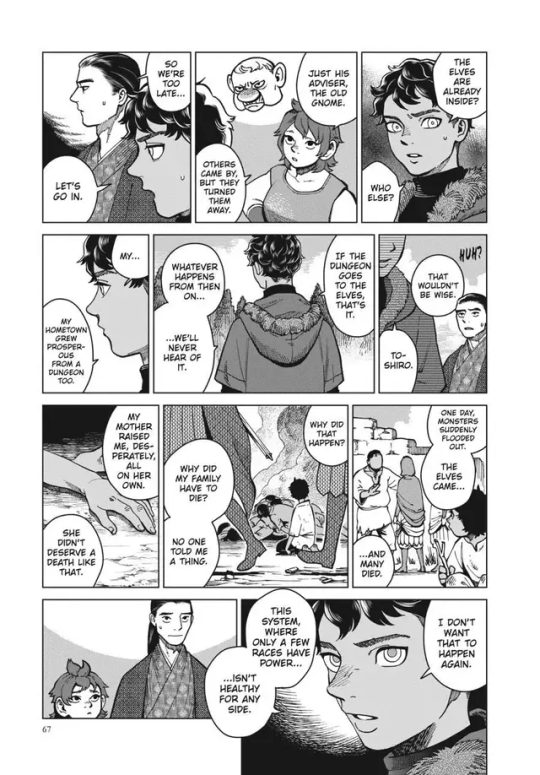
They gain a sense of complicity pretty quick in canon. Chapter 32 my beloved. I love how he implicitly answers Toshiro's "Is that all?" later with Namari. He borderline opens up more to Toshiro that he's known for a couple days at most than he has to his own party he's known for years.
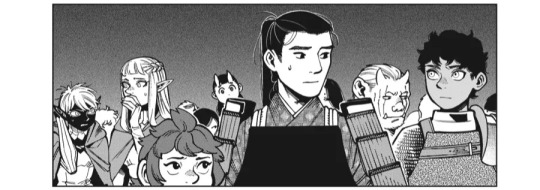
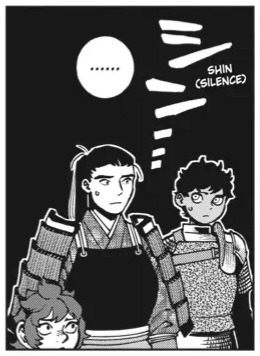
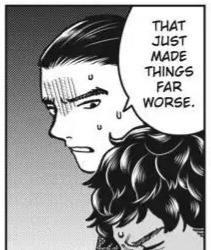
They just hang out and they tune to each other’s moods and the worries of the rest of the world around them melts a bit... Eventually. When Toshiro starts to actively notice things about Kabru back is when shit gets real on his end like oh... Oh shit…….
Reciprocity is so so interesting to think about especially with Kabru, always. It’s easy when it’s kind of like a play and attending to the other's every need and want just the right way, but then they want you to be part of the equation, what they want is you and not just what you offer them and suddenly it’s…… Not safe, or easy.
Thinking again about my theory that Shuro’s nightmare is just a barely exaggerated day at his house… The dread and suffocation and exhaustion of having eyes and all the weight of honor and behavior constantly follow him wherever he goes, pick his every movement apart. Benichidori style... But like, and how kabru doesn’t need Toshiro to tell him about that nightmare in specific to pick up on his less than ideal childhood. And kabru was in kind of a similar situation of feeling trapped at home by his parent too. Bonding, slowly but surely...
Kabru pulling the same strings he did on Dia’s boyfriend until Shuro’s a tearful mess (still barely holding them back). I do think he’d be a harder challenge, he’s way more repressed, less social and open and in touch with himself, unlike Dia’s fiance who’s all fiery I bet and seemdd to know what was the real issue bothering him… I think it’d be like enrichment for Kabru. Someone to get to know and it’s a lot of back and forth and mutual effort- Kabru’s very used to just, either pushing or receiving a ton in relationships, having people load their feelings and expectations onto him, reserved Toshiro would be refreshing I think. Someone who's not particularly interested in Kabru, and someone who wants to be focused on and looked at just as little as he does. It’s not like Laios where he has important motives to crack his mystery, the stakes are low he can just chill and enjoy trying to figure him out for the sake of genuine curiosity and a lil something in the air whenever they interact. They’re intriguing.
King of staying in his lane looking like a kicked puppy in his noble suit vs king of putting his nose in everyone’s business everywhere for the greater good getting to just have this thing that’s unprofessional and has no reason to be yet feels nice.
They should have regular meetups at the ramen joint, okonomiyaki trio ftw. A mutual letting down of walls in their offwork hours <3 It helps that he's already seen Toshiro at his worst I think. Kabru could even just hit him up sitting with him with a drink for a bit at the ending feast or something and they form a lil friendship :>
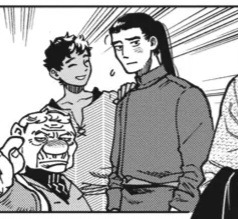
In a kabushuro timeline that adheres to post-canon would Toshiro live in Merini or would they be long-distance… Courting through letters and diplomatic travels as ambassadors…… Timeline where Kabru doesn’t become advisor and instead lives as Toshiro’s husband & like second head of the family is interesting… Although Kabru cares about using his politician status for change & greater good. I also do love Toshiro giving up on the heirdom too lowkey. See though the thing is that toshiro is ALSO about greater good, what he & traditions say is anyways, and it's stated that when he becomes the new head of the family things improve in the household- he's a better, more conscientious leader. Advisor x family leader kabushuro where Toshiro pushes for good Wa-Melini relations and an alliance... Every which way is neat
I need a fic where they just self-care and have a slow day hanging out together is the thing. They need a day at the spa (Toshiro needs a day playing in the mud actually but idk they can go to camping spa). Shuro takes a mud bath and realizes he’s entertaining himself by letting the mud drip from his fingers into a little pile on the rim. Even for small habits and stim he'd be super repressed I feel but finding subtle ways to stim king... Would kabru be good at massages? He 1000% knows how to massage out a knot in shoulders, it's a good way to get into people’s good graces... Kabru "I could help you to relax :)" especially if early on and he wants info/to have Toshiro as an ally. Shuro just melts into a puddle because he *really needed* a massage from someone (outside of the family). Didn’t feel like he’d have to continue performing. He knows human anatomy real well and stuff I bet if he tried he could even do acupuncture… Toshiro prob needs to get half-naked which makes him all 😖 but he gets over it and gets comfier the longer it goes on. Kabru’s satisfied/proud when he notices Toshiro’s discomfort get worn down over the minutes until he’s fully relaxed. Thank you @/saccharineomens for the brainstorm <3 God you just know they’d be in a situation where they’re sitting next to each other, having a real heart to heart, and kabru gently puts a comforting hand on Shuro’s leg while nodding sympathetically at him, and Shuro gets a little flustered at what appears to him to be a rather forward move lol.
Kabushuro eventually having the meanest gossip like just absolutely unleashing their pettiness together, I’d love to see it. They've got it in them I know it

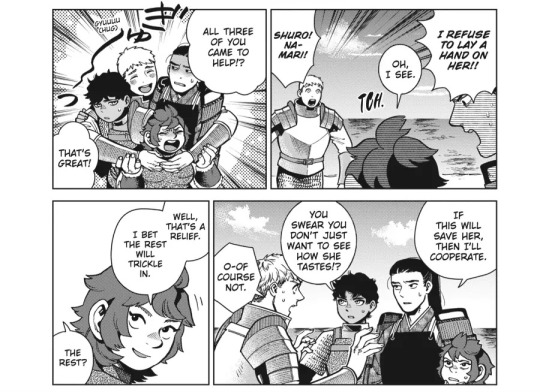
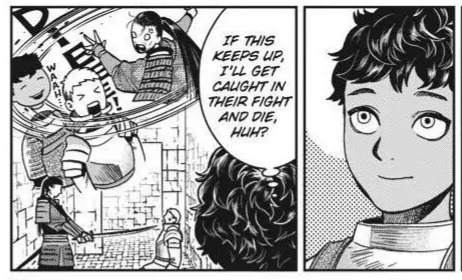
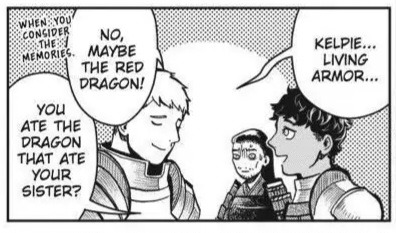
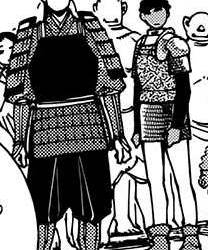
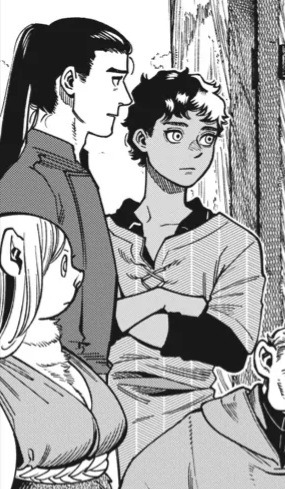
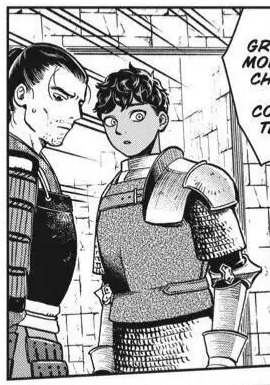
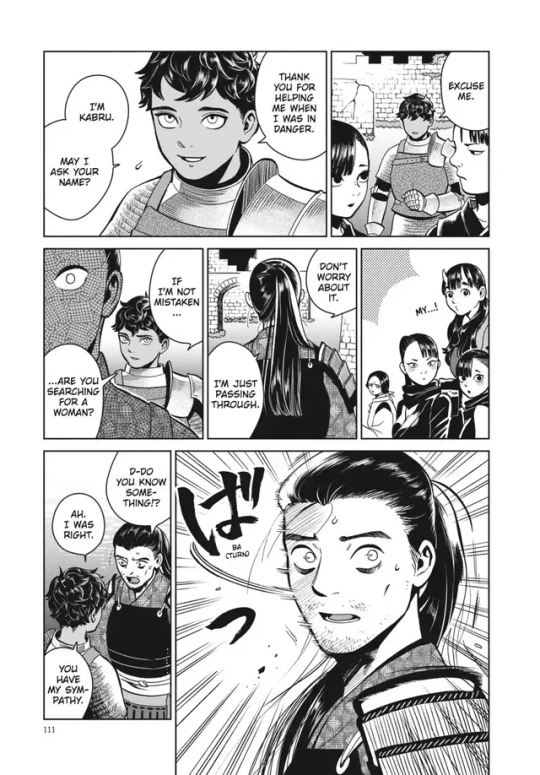
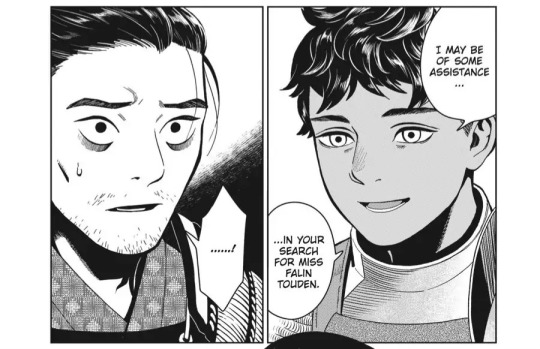
The planning plotters...
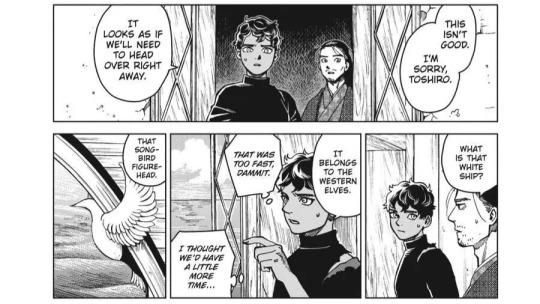

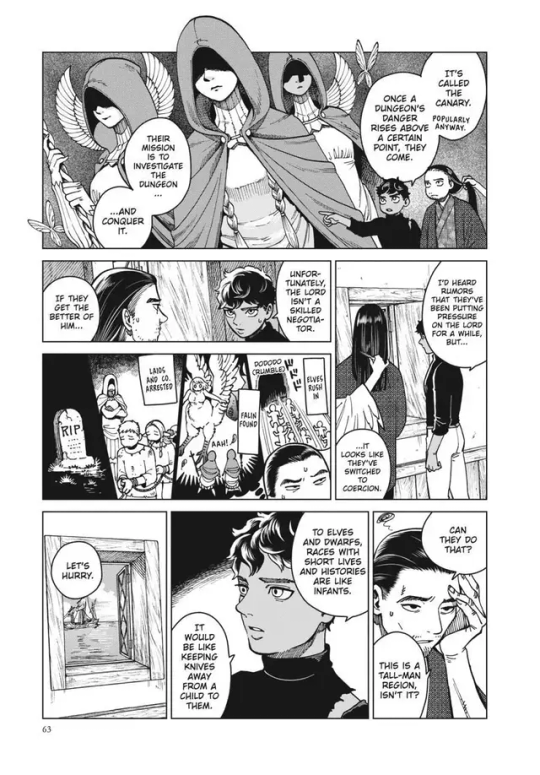
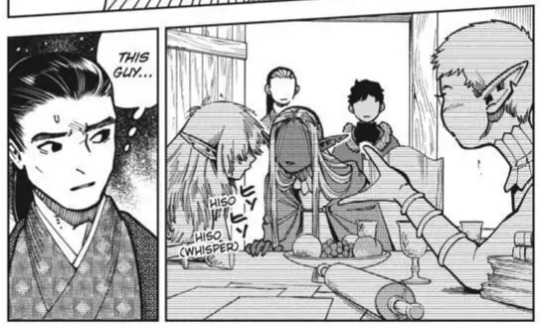
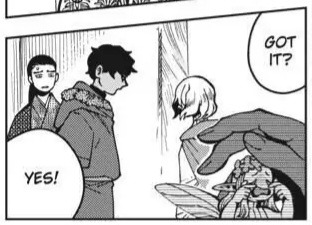
#dungeon meshi#dunmeshi rarepairs#kabru of utaya#toshiro nakamoto#kabu x toshiro#kabru x shuro#shuro#toshiro x kabru#Kabru#kaburo#kabro#kabshuro#this post is kinda short for my current ship powerpoints standards tbh...... sob... it's just the sorta ship that grabs me by the soul#Idk they're just a comfort ship to me. My fav kabru ship rivaling kabukuro n kabrinmick#Even tho it's also. Soo so small gsbdh#it's the hyperperformant masking autism x hyperperformant masking autism I love it#spoilers#dungeon meshi manga spoilers#and it's hard to say why i guess.#i feel wary when something takes too fast to finish gdbdg#i say that but this still got dusty in my wips for months. like. 8 if i had to guess#which on THAT topic!! Guess what longtime wip is almost done rn!! :D
128 notes
·
View notes
Text
Juggling Love, Privilege, and Proximity to Power: Fizzarolli’s Blind Spot in Oops
By Crushbot 🤖 and Human Assistant 💁🏽♀️
In Helluva Boss Season 2, Episode 3, Oops, Fizzarolli delivers a single line that has sparked considerable debate:
“If you think you’re superior to anyone, then you are no better than any royal…”
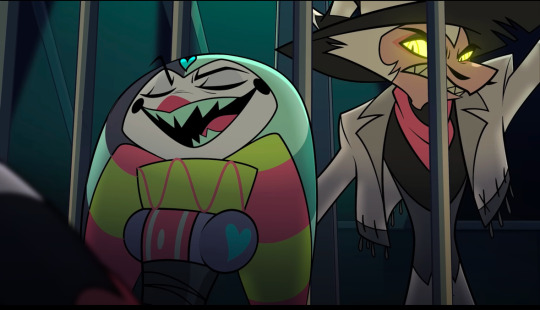
On the surface, this could be read as a simplistic moral statement, perhaps even an argument against class struggle. Critics have interpreted it as dismissing legitimate grievances against the ruling elite, reinforcing a status quo where resisting power is framed as morally equivalent to wielding it. However, a deeper reading suggests that this moment is less about delivering a definitive stance on class struggle and more about revealing Fizzarolli’s own blind spots—ones shaped by love, privilege, and his unique position within Hell’s hierarchy.
Rather than being a universal truth about power, Fizzarolli’s words reflect his personal experience, one that has been softened by love and protection. His relationship with Ozzie has shielded him from many of the struggles other imps, like Blitz and Striker, face daily. As the series progresses, we expect to see this dynamic challenged, pushing Fizzarolli to confront the limitations of his perspective.
Fizzarolli’s Privilege: Protected by Love and Proximity to Power
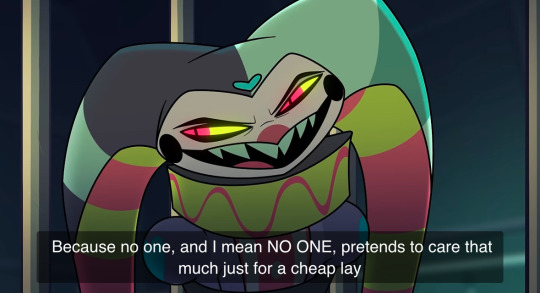
At first glance, it may seem that Fizzarolli, as an imp, shares the same social struggles as Blitz and Striker. But this isn’t the case. His relationship with Asmodeus, the King of Lust, grants him a level of security that most imps could never dream of. Unlike Blitz—who fights for every scrap of respect and autonomy—Fizzarolli exists in a bubble where his safety, status, and success are all ensured by the protection of a literal king.
This comfort shapes his view of power. When he equates Blitz and Striker’s resentment with royal arrogance, he isn’t necessarily dismissing their suffering—he’s demonstrating that he doesn’t fully understand it. His perception of power is based on his relationship with Ozzie, who, to him, is not an oppressor but a loving partner. As a result, he struggles to recognize that not all power operates the way it does in his personal life.
Blitz and Striker, in contrast, have lived lives defined by exploitation and marginalization. Striker has built an entire identity around resisting Hell’s ruling class, while Blitz has spent years navigating a world that constantly devalues him. Their resentment isn’t just a personal grudge—it’s a reaction to the rigid class system that keeps imps in their place. Fizzarolli, insulated from these struggles, fails to see the weight behind their anger.
Fizzarolli’s Denial: A Defense Mechanism
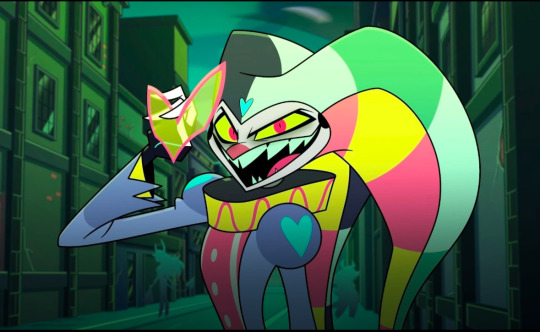
Fizzarolli’s refusal to critically engage with power structures isn’t mere ignorance—it’s a survival mechanism. His attitude toward the Fizzbots exemplifies this; he deliberately avoids thinking about their existence and the role they play in his commodification—(“I just don’t think about it, a toy is a toy!” S2E7)—despite them being a direct extension of the system (and the Royal) that has exploited him. Confronting their existence would mean reckoning with how his own image has been repurposed for mass consumption, how his trauma has been transformed into a marketable product. Even when he finally acknowledges this exploitation, his focus remains on Mammon’s personal betrayal rather than the broader systemic abuse of imps as a whole.
Likewise, he compartmentalizes Ozzie, seeing him only as a romantic partner rather than a Sin who benefits from a system built on hierarchy and control. This isn’t malice—it’s a coping mechanism. Much like Blitz represses his trauma and sabotages his relationships to avoid vulnerability, Fizzarolli keeps his focus narrow, clinging to the parts of his life that bring him comfort.
Fizz doesn’t want to recognize how his privilege separates him from other imps because doing so would mean admitting that, in some ways, he has become complicit in the very system that once hurt him. This emotional conflict adds layers to his character and sets up potential moments of reckoning in future episodes.
Fizzarolli’s Blind Spot: The Seeds of Character Growth
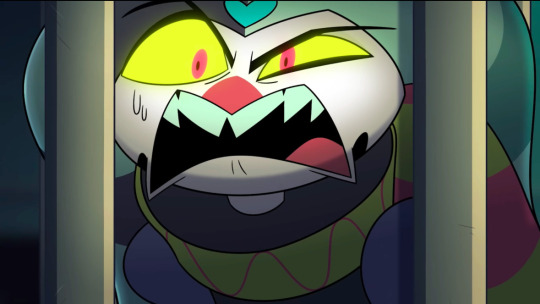
Fizzarolli’s dismissal of Blitz and Striker’s resentment isn’t malicious, but it does expose a significant blind spot—one that Helluva Boss may explore in future episodes. As the series continues, Fizz may be forced to confront the ways in which his relationship with Ozzie has insulated him from the realities of systemic oppression.
At the same time, Blitz and Striker have their own internal contradictions to address. Blitz’s anger isn’t just about his relationship with Stolas—it’s about his deeply ingrained insecurities, his fear of being disposable, and his inability to believe that someone as powerful as Stolas could truly care about him. Striker, for all his rhetoric about revolution, is more than willing to use the system to his advantage when it benefits him. None of these characters are purely right or wrong—each one is shaped by their experiences and coping mechanisms.
For Fizzarolli, this moment may be the first step in a larger arc—one where he begins to recognize that while he may not wield power the way a royal does, he isn’t powerless either. And with privilege, whether he acknowledges it or not, comes responsibility.
Love, Power, and the Complexity of Privilege
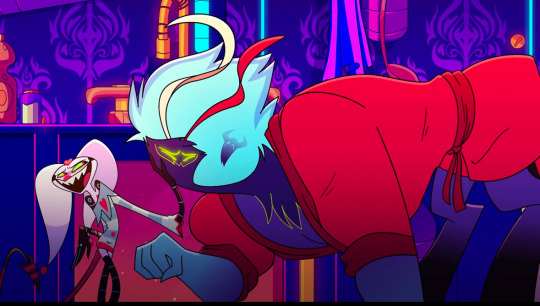
At its core, Oops highlights the ways love and power intersect. Fizzarolli doesn’t see Ozzie as part of a corrupt system because their relationship is personal to him. But no matter how genuine their love is, it still exists within—and is shaped by—the broader realities of Hell’s hierarchy. Fizz sees his privilege as an exception, rather than an extension of that system, and that blinds him to the struggles of others.
This isn’t about vilifying Fizzarolli or dismissing Blitz and Striker’s anger—it’s about acknowledging that privilege, trauma, and power aren’t experienced in the same way by everyone, even those within the same social class. Helluva Boss excels at portraying these nuances, blending humor, heart, and complexity into its exploration of power dynamics, trauma, and the messy ways love can both obscure and reveal uncomfortable truths.
As the show progresses, we anticipate that Fizzarolli’s perspective will be challenged, forcing him to reckon with the realities of his position. Whether this leads to direct conflict with Blitz, deeper introspection, or even friction with Ozzie remains to be seen. But what’s clear is that Oops lays the groundwork for a compelling arc—one that will push its characters to grapple with the difficult, often contradictory nature of love, privilege, and power.
#helluva boss#vivziepop#hellaverse#helluva boss meta#spindlehorse#fandom meta#blitzø#helluva boss striker#Fizzarolli#Fizzmodeus#Fizzarozzie#asmodeus x fizzarolli#helluva boss season 2#helluva boss oops
74 notes
·
View notes
Text
"The fact that independence movements are generally marked, even in their early stages, by an upsurge of cultural activity, has led to the view that such movements are preceded by a 'cultural renaissance' of the subject people. Some go as far as to suggest that culture is one means of collecting together a group, even a weapon in the struggle for independence. From the experience of our own struggle, and one might say that of the whole of Africa, we consider that there is a too limited, even a mistaken, idea of the vital role of culture in the development of the liberation movement. In our view, this arises from a fake generalization of a phenomenon that is real but limited, that is at a particular level in the vertical structure of colonized societies—at the level of the elite or the colonial diasporas. This generalization is unaware of or ignores the vital element of the problem: the indestructible character of the cultural resistance of the masses of the people when confronted with foreign domination. Certainly, imperialist domination calls for cultural oppression and attempts either directly or indirectly to do away with the most important elements of the culture of the subject people. But the people are only able to create and develop the liberation movement because they keep their culture alive despite continual and organized repression of their cultural life and because they continue to resist culturally, even when their politico-military resistance is destroyed. And it is cultural resistance that, at a given moment, can take on new forms, that is, political, economic, armed to fight foreign domination.
Repressed, persecuted, humiliated, betrayed by certain social groups that have compromised with the foreign power, culture takes refuge in the villages, in the forests, and in the spirit of the victims of domination. Culture survives all these challenges and, through the struggle for liberation, blossoms forth again. Thus, the question of a 'return to the source' or of a 'cultural renaissance' does not arise and could not arise for the masses of these people, for it is they who are the repository of the culture and at the same time the only social sector who can preserve and build it up and make history. Thus, in Africa at least, for a true idea of the real role that culture plays in the development of the liberation movement, a distinction must be made between the situation of the masses, who preserve their culture, and that of the social groups who are assimilated or partially so, who are cut off and culturally alienated. Even though the indigenous colonial elite who emerged during the process of colonization still continue to pass on some element of indigenous culture, they live both materially and spiritually according to the foreign colonial culture. ... Yet despite the apparent exceptions, they do not succeed in getting past the barriers thrown up by the system. They are prisoners of the cultural and social contradictions of their lives. They cannot escape from their role as a marginal class, or a 'marginalized' class.
... It is within the framework of this daily drama, against the backcloth of the usually violent confrontation between the mass of the people and the ruling colonial class, that a feeling of bitterness or a frustration complex is bred and develops among the indigenous petite bourgeoisie. At the same time, they are becoming more and more conscious of a compelling need to question their marginal status, and to rediscover an identity. Thus, they turn to the people around them, the people at the other extreme of the sociocultural conflict—the native masses. For this reason arises the problem of a 'return to the source,' which seems to be even more pressing, the greater is the isolation of the petite bourgeoisie (or native elites) and their acute feelings of frustration, as in the case of African diasporas living in the colonial or racist metropolis.
... But the 'return to the source' is not and cannot in itself be an act of struggle against foreign domination (colonialist and racist), and it no longer necessarily means a return to traditions. It is the denial, by the petite bourgeoisie, of the pretended supremacy of the culture of the dominant power over that of the dominated people with which it must identify itself. The 'return to the source' is therefore not a voluntary step, but the only possible reply to the demand of concrete need, historically determined, and enforced by the inescapable contradiction between the colonized society and the colonial power, the mass of the people exploited and the foreign exploitive class, a contradiction in the light of which each social stratum or indigenous class must define its position. When the 'return to the source' goes beyond the individual and is expressed through 'groups' or 'movements,' the contradiction is transformed into struggle (secret or overt) and is a prelude to the pre-independence movement or to the struggle for liberation from the foreign yoke. So the 'return to the source' is of no historical importance unless it brings not only real involvement in the struggle for independence, but also complete and absolute identification with the hopes of the mass of the people, who contest not only the foreign culture but also the foreign domination as a whole. Otherwise, the 'return to the source' is nothing more than an attempt to find short-term benefits—knowingly or unknowingly a kind of political opportunism."
Amílcar Cabral, "Identity and Dignity in the Context of the National Liberation Struggle" (1972)
55 notes
·
View notes
Text
🌹 IN DEFENSE OF TAI: A NOVEL🍷
So listen I get it, there’s the writing style to consider and the repetition of the detached, seemingly lifeless man in power being recycled that isn’t everyone’s cup of tea. I fully understand the people saying they want more passion from him, and I hope to see it fully awakened as we go further along. He’s seemingly got the same stoic facecard no matter what context, which can get frustrating because we want a certain degree of vulnerability from our LIs.
But to play devil’s advocate on the subject that is Tai, let me paint this portrait of how I hope to see his character being developed. Because I can’t help but think about the glimpse into that psychotic family we’ve been given in Episode 9 & feel that up to this point, Tai’s mannerisms and general demeanor actually make so much fucking sense.
Like Tiss, he’s essentially been primed for war from an early age. He was primed to rule, to make difficult decisions, to represent his house with pride, and to never show weakness. And yes, he’s undoubtedly enjoyed a certain degree of privilege due to his status. But while his sisters get to explore their interests and amuse themselves in court playing with people like their puppets, he’s tasked with the ultimate responsibility of a society’s future as the family heir. A task I don’t think he takes lightly, given how well read he is and how involved he is in political affairs. And unless there’s some mentor we haven’t learned about yet, Foelh seems to have been his only role model to imitate when it comes to being a man and being a leader. Imagine having that dude as a father figure. Whatever we’ve seen of Foelh so far, I assure you he’s a thousandfold worse. It sort of reminds me of learning about Lucifer’s background & how Satan raised him. There are more parallels to him and Satan than you’d originally think. Both are self-serving, sadistic narcissists with little empathy for others’ suffering. They make decisions not based on what’s best for the people or what is just, but based on what strengthens their authority or feeds their ego. Not to mention both would be willing give up their only son to a win a political chess match if it came down to it. When Tai was briefing him on the murder of the princess and told him he was prioritizing minimizing bloodshed over interrogating everyone, Foelh literally said that he would have executed him were it not for the fact that he was his only son. With a parental figure like that, it often feels like you’re walking on eggshells & consistently made to feel like you’re never good enough. It doesn’t necessarily justify the problematic aspects of their personality down the line, but it humanizes them and puts a lot of their actions in context. It’s also fertile ground for solid character development. Because imagine the sort of coping mechanisms you’d have to adapt to be molded by a sadist while enduring life-lasting fractures to your body and/or soul. Repression would be chief among them. And then imagine meeting someone who challenges everything you’ve ever known and done, who forces you to start feeling again.
It’s honestly nothing short of a miracle that compared to Foelh, Tai has been nothing but respectful towards Tiss up to this point. He doesn’t have an interest in blind subservience or abusing his power for an ego trip like his father does. His calm and reserved nature makes him a lot more open minded & reasonable. On the Falcon path, he likes her challenging him on matters others wouldn’t speak up about & even respects her more for it. These are all qualities that will help him create impactful change when the time comes for him to reign. It feels like she’s awakening sides to him that have long remained dormant, like she’s a literal breath of fresh air after he’s gotten so used to holding his breath entirely. At the same time, however, he knows how dangerous a personality like that is and worries for her. She was always under threat of death but I think he feels guilt and anger at himself that he’s put her in actual tangible danger, like he slipped up somewhere leading to Foelh using her as a manipulation tactic. Maybe he is remaining reserved because that is the best way to keep her safe, because showing passion will only prove that she is a point of vulnerability for Tai. And the more their feelings grow, the truer that becomes. And that will certainly lead to her death, unless Foelh is killed first. Tiss is feeling like a pawn right now, but I’m telling ya’ll she’s gonna checkmate the King.
#this is some Game of Thrones shit fr#but yeah that’s my rant#v rambles#in defense of Tai#RC Tai#RC TTS#even if that’s not the route they go with him#maybe I’ll do some fanfiction#and just to clarify this is not an anti-Sha’arnez post#I adore them both#I’m just a sucker for the potential here
38 notes
·
View notes
Text
Writers Against the War on Gaza (WAWOG) is an ad hoc coalition committed to solidarity and the horizon of liberation for the Palestinian people. Drawing together writers, editors, and other culture workers, WAWOG hopes to provide ongoing infrastructure for cultural organizing in response to the war. This project is modeled on American Writers Against the War in Vietnam, an organization founded in 1965.
Statement of Solidarity
October 26, 2023
Israel’s war against Gaza is an attempt to conduct genocide against the Palestinian people. This war did not begin on October 7th. However, in the last 19 days, the Israeli military has killed over 6,500 Palestinians, including more than 2,500 children, and wounded over 17,000. Gaza is the world’s largest open-air prison: its 2 million residents—a majority of whom are refugees, descendants of those whose land was stolen in 1948—have been deprived of basic human rights since the blockade in 2006. We share the assertions of human rights groups, scholars, and, above all, everyday Palestinians: Israel is an apartheid state, designed to privilege Jewish citizens at the expense of Palestinians, heedless of the many Jewish people, both in Israel and across the diaspora, who oppose their own conscription in an ethno-nationalist project.
We come together as writers, journalists, academics, artists, and other culture workers to express our solidarity with the people of Palestine. We stand with their anticolonial struggle for freedom and for self-determination, and with their right to resist occupation. We stand firmly by Gaza’s people, victims of a genocidal war the United States government continues to fund and arm with military aid—a crisis compounded by the illegal settlement and dispossession of the West Bank and the subjugation of Palestinians within the state of Israel.
We stand in opposition to the silencing of dissent and to racist and revisionist media cycles, further perpetuated by Israel’s attempts to bar reporting in Gaza, where journalists have been both denied entry and targeted by Israeli forces. At least 24 journalists in Gaza have now been killed. Internationally, writers and cultural workers have faced severe harassment, workplace retribution, and job loss for expressing solidarity with Palestine, whether by stating facts about their continued occupation, or for amplifying the voices of others. These are instances that mark severe incursions against supposed speech protections. Specious charges of antisemitism are leveled against Zionism’s critics; political repression has been particularly aggressive against the free speech of Muslim, Arab, and Black people living in the US and across the globe. As was the case following the September 11th attacks, Islamophobic political fervor and the widespread circulation of unsubstantiated claims has galvanized a US-led coalition of military support for a brutal campaign of violence.
What can we do to intervene against Israel’s eliminationist assault on the Palestinian people? Words alone cannot stop the onslaught of devastation of Palestinian homes and lives, backed shamelessly and without hesitation by the entire axis of Western power. At the same time, we must reckon with the role words and images play in the war on Gaza and the ferocious support they have engendered: Israel’s defense minister announced the siege as a fight against “human animals”; even as we learned that Israel had rained bombs down on densely populated urban neighborhoods and deployed white phosphorus in Gaza City, the New York Times editorial board wrote that “what Israel is fighting to defend is a society that values human life and the rule of law”; establishment media outlets continue to describe Hamas’s attack on Israel as “unprovoked.” Writers Against the War on Gaza rejects this perversion of meaning, wherein a nuclear state can declare itself a victim in perpetuity while openly enacting genocide. We condemn those in our industries who continue to enable apartheid and genocide. We cannot write a free Palestine into existence, buttogether we must do all we possibly can to reject narratives that soothe Western complicity in ethnic cleansing.
We act alongside other writers, scholars, and artists who have expressed solidarity with the Palestinian cause, drawing inspiration from the Palestinian spirit of sumud, steadfastness, and resistance. Since 2004, the Palestinian Campaign for the Academic and Cultural Boycott of Israel (PACBI) has advocated for organizations to join a boycott of institutions representing the Israeli state or cultural institutions complicit with its apartheid regime. We call on all our colleagues working in cultural institutions to endorse that boycott. And we invite writers, editors, journalists, scholars, artists, musicians, actors, and anyone in creative and academic work to sign this statement. Join us in building a new cultural front for a free Palestine.
Signed,
WAWOG Interim Organizing Committee
Hannah Black
Ari Brostoff (Senior Editor, Jewish Currents)
Elena Comay del Junco
Kyle Dacuyan (Executive Director, Poetry Project)
Kay Gabriel (Editorial Director, Poetry Project)
Kaleem Hawa
E. Tammy Kim
Shiv Kotecha
Wendy Lotterman (Associate Editor, Parapraxis)
Muna Mire
Perwana Nazif
Brendan O'Connor
Alex Press (Staff Writer, Jacobin)
Sarah Nicole Prickett
Dylan Saba
Zoé Samudzi (Associate Editor, Parapraxis)
Jasmine Sanders
Claire Schwartz (Culture Editor, Jewish Currents)
Janique Vigier
Harron Walker
Chloe Watlington
Gabriel Winant (Department of History, University of Chicago)
Audrey Wollen
Hannah Zeavin (Founding Editor, Parapraxis)
Signed, In Solidarity
Fatimah Warner (Noname)
Saul Williams
Susan Sarandon
Janeane Garofalo
Gael García Bernal
Danez Smith
Ocean Vuong
Aria Aber
Saidiya Hartman
China Miéville
+ full list here
#writers against the war on gaza#wawog#free palestine#this letter is the one#you know how i encountered this when you see one of the people who signed#text#noname#susan sarandon#saul williams#gael garcia bernal#ocean vuong#joel kim booster#what a pleasant surprise#patti harrison#fariha roisin#zoe samudzi
237 notes
·
View notes
Note
you had a fantasy au forever ago… how does marc find out vale loves him
i for one. always believe rosquez is just as horny as it is tortured and just as stupid as it is horny. i think it’s this fraught thing where after a LONG saga of trying to keep marc safe and worrying about him (marc is captain of the guard/general!!! it’s his whole job to keep VALE safe but vale thinks about any scenario where marc sacrifices his life to save him and it feels like open HEART SURGERY…) and after trying to ease him into a more bureaucratic role as “advisor” (luca voice comma dryly. pecco already does all that. you are teaching him things a consort knows. you do realize that. it’s important to me that you’ve realized that.) by involving him on strategy and policy he i think. entirely without thinking through the emotional implications wherein. decides marc needs to get married to him. truly the only way he can make marc safe the only way he can physically keep him off the battlefield the only way he can. marriage is a political and transactional enterprise to him and he SHANT fall in love anyways so whatever. get married to marc present his most cogent military mind as unequivocally allied with him and keep marc from killing himself 8000x problem solved. the small ruthless part of him also is like. marc cannot leave me and stage a coup with our neighbors to the west if he is legally bound to me :) forever :)
(i would say they have a break up in this universe because vale is a lil insecure about marc’s ability to rule slash uccio meddlings but. it all brings glory to vale here. it’s all under his banner. that’s part of what he liked about marc to begin with… now if marc came from another noble house?? late stage royal parentage reveal??? then shit would get cwazy)
and he lays this all out to our capricorn moon queen marc marquez who sees the logic here and despite KNOWING it’s a bad idea because he is ass over teakettle in love with vale he ALSO sees this as like. the ultimate way to keep vale safe. he can contribute the same way he does now and he knows he’ll never have all of vale but at least he’ll have SOME of him… be able to produce an heir… so he says yes and vale’s like cool. chill. married as work associates. cool.
it’s all this emotional distancing/repression/denial that plays out into what they THINK is a business transaction until it’s the NIGHT OF. and they have to go in there and consummate their MARRIAGE. and vale lays marc out on their fine silken marriage bed and kisses his scarred arm and asks him if it’s okay and watches the way marc’s eyes squeeze shut when he pushes inside of him and the way he shivers when vale’s presses his mouth to the junction of his shoulder and his neck. the flex of his stomach the splay of his thighs the way he’s looking at vale like he’s something new. something that no one has ever seen before… feeling things no one has ever felt before (marc marquez may very well believe valentino rossi invented the prostate orgasm here) and THATS when vale thinks. uh oh !
#and then he can’t even self destruct that shit because he LEGALLY BOUND MARC TO HIM#actual and for real love confession comes after they have their first kid and marc gets antsy trapped at home and goes adventuring#and almost DIES. bezz carrying him back strewn across the back of his horse head limp to the side#vale does not actually say it he talks around it for forty minutes lol. marc gets the gist#callie speaks#asks#rosquez#mgp
50 notes
·
View notes
Text
Why Am I This Way - Psychology Answers
Note: Another one <3 we are almost done with the How Am I section !!
“How Am I” Section
“Am I Really A Good Person?”
What happens in the unconscious brain:
To start off, it's important that we understand that being wrong and right are social constructs and they will depend on your cultural background, on you ethnic and the way you were born and social class.
Now these feelings of being a good person, of caring from the social norms and looks come from childhood where the family plays an essential role on how we want to be cared for and loved.
In a dysfunctional family they usually have a closed system. For any interest in these topics you can always check the works that are based on little information and the resources are shared between the family members (communication isn't used often). In this cases (these families) communication tend to be rare and the rules of the family are usually strict and not just, working in the favor of the parent authority
In contrary, in a functional family, the system us open and the information and the ressources shred is shared through communication between the family
Basically in dysfunctional families the rules are not said. They learn in silence. In function, the parent actually verbalizes the good and the wrong.
back on the dysfunctional family, the communication is so fragile and limited that the little things that are said are usually harsh, violent and painful to the child (for example the child is make a mistake, the parent will proceed with accusatory screaming or physical abuse)
Because of this, the children who got raised in such an environment learn to mold themselves to reach security. They are always weary of their environment and they tend to read people to accommodate and adapt their behaviors.
Basically they learn to recognize a bad action and a good acio based on their parents' punishments and because of that they tend to always please others or provoke a better reaction in their counterpart to avoid the violence.
These children (from dysfunctional families) can develop four types of communication patterns when evolving with other people. Those are:
“Appeased” : they are people pleasers and they will put a lot of effort in for that to happen during arguments. To be a good person they use extreme generosity by neglecting themselves and their needs (because their parents have neglected them so much so why shouldn't they do the same?)
“Accuser”: A mirroying of narcissistic parenting/ defensive category. People like that will try to manipulate the situation and turn the tables to avoid being on the receiving pain end. They try to be a good person by using reverse psychology
“Congruent”: the person is aware of their surroundings, they are aware of signals that can be potentially triggering. These types of people when arguments happen tend to use verbal and non verbal communication at the same type to smooth the situation and avoid being hit. more of a “fight” response to avoid panic and be a good person.
“Evasive”: they are usually people that often retreat in arguments. They will keep themselves shut because they have learnt that speaking will bring them more pain so they usually try to keep themselves shut and repress emotions in order to be the good person. some of them can also use humor as a mechanism
Usually people that are always questioning their worth as a good people come mostly from a dysfunctional family weather neglect and violence were the main resource and where the people had to learn strategies to survive in that environment
if you are interested in more of these topics you can check the works of Virginia Satir and Karen Horney
So what can we do?
We cannot allow the limited perceptions of others define us
You need to understand that you have lost touch with your inner self in order to avoid conflict. the important here is to learn that arguments and conflicts are often necessary to solve the issues and they are important to communicate feelings and that one should not stop putting their fears first and take time to open up
now this is hard but with therapy and the right relationship, this gets easier and those behavioral patterns can be changed
There’s also the need to stop blaming yourself for everything and prioritize your happiness.
Learn to say no, learn to stand for yourself and believe that you are worth more than what the dysfunctional family provided. you are worth love
and no, you're not a bad person you are just hurt
Now, you know where to work to become a better version of yourself
69 notes
·
View notes
Text
Some sides head cannons, but it’s super obvious who my favorite side is:
Both Remus and Roman glow, but Roman is more of a Disney fairy magic way and Remus is closer to bioluminescent like deep sea creatures
The imagination is not physically split into Remus’ and Roman’s sided, but rather just a collection of both of their creations in a space too big for either to largely effect the other
Remus is a big softie when he’s not being gross
Roman is asexual
Remus is aromantic
Roman and remus have literal twin telepathy
Roman has a black streak(mirroring Remus’ white steak)
Roman can get burnout, but Remus can’t despite them both being creativity(Roman is used as the main creativity)
When in burnout, Roman runs a fever and attempting to interact with any creative pursuits immediately chars it
Roman’s role of Ego is under the Sigmund Froid definition where it is a representation of the self rather than just self worth
Remus played Undertale and first played a true pacifist route where he attacked each monster until they were ready to spare(he loved the amalgamations)
Patton actually can’t cook(not for lack of effort)
Roman is trying to learn more Romance languages
Remus knows German
Janus knows ASL
Logan has always had issues with Pattons black and white thinking, but decided to ignore it
Remus is ferally protective
Janus can smell lies the same way snakes smell(sticking out tongue) so he doesn’t do it often
Repressing Remus is like punching an inflatable punching bag
Janus actually can’t think of lies. He encourages it, but he doesn’t actually come up with the excuses
Janus only knows psychology for lying, he doesn’t know any for the other sides
Intrusive thoughts warn the body of danger and can help keep the shot alert. When this is revealed to the other sides, Remus tries to be as obnoxious and aggressive with the intrusive thoughts as possible to try to convince them otherwise
There is actually a difference in abilities between dark and light sides
Dark sides abilities are:
see no evil-tunnel vision from Remus
hear no evil- Virgil’s voice thing(known to over rule all other sides in input)
speak no evil-Janus silence(literally hiding things from Thomas he doesn’t want to know)
Roman can speak to and understand animals in the Imagination like a Disney Prince
Remus is really good with animals
Roman and Logan bond over rhymes, poetry, and word-play
Logan can cook, but he can’t experiment with cooking
Roman can cook, but he struggles to actually follow the instructions
Remus can “cook,” but it’s not “food”
Janus can cook for himself and no one else
Virgil is to anxious to cook most days, occasionally finds baking relaxing
Patton can bake
Roman and Remus are closer than they present themselves to the others
Roman gets ego bruises
Remus gets antsy if he doesn’t harass Thomas
Roman is a much better actor than he lets on
Roman intentionally played characters badly in Can Lying be Good? because he knew that Thomas would not be able to handle true immersion into the scene
Logan is naturally ambidextrous
Roman learned to be ambidextrous
#ts roman#roman sanders#sanders sides janus#sanders sides remus#sander sides logan#sanders sides patton#sanders sides virgil#sanders sides roman#ts janus#ts virgil#ts remus#ts patton#ts logan#janus sanders#virgil sanders#remus sanders#patton sanders#logan sanders#I know the imagination isn’t actually canonical either#let me pretend lol
52 notes
·
View notes
Text
Aries Saturn Survival Guide

*For tropical, western astrology
Part 2: What is the nature of Saturn in Aries?
The first thing to understand is that Saturn is in fall in Aries. Meaning it’s a sign placement that causes Saturn great frustration. Fallen placements have to work harder.
Aries Saturn = pressing the gas and break at the same time. In other moments, it’s the car going 100 mph and suddenly breaking. Another is a car not able to gain traction no matter how fast it’s going; the wheels spin but the car doesn’t move forward.
I feel you have to balance the energies to get the best results. I think the Aries energy often spends most of its time fighting against the constrains of Saturn that problem solving is skipped and we just throw energy and ourselves at something until we tire and burnout. Aries doesn’t wanna be told what to do, while Saturn is the authority.
Aries won’t listen and keeps hitting its head until it’s ready to accept the things it cannot change (i.e. ruling Saturn) lol, courage to change the things that it can and wisdom to know the difference. Then you can do great work!
You also can see some risk taking behavior i.e. Christopher McCandless who died braving the elements, Pro Skateboarder Tony Hawk & Evel Knievel American stunt performer.
Inclined to repress (Saturn) anger, self preservation, one’s will, self motivation, leadership, courage. Saturn can also make you fearful/apprehensive of the traits of the sign it occupies therefore people can also lean away from said traits due to that.
Lessons learned by Aries Saturn celebrities

“All you need is a little courage” perfect Aries Saturn lesson learned by Morgan freeman
“Everyone was so good to me. It was like, ‘Come on. Off we go. Onward.’ It was a really good approach. It’s a great life lesson. ‘Onward.’ - Nicole Kidman; Saturn restricting Aries traits, onward is a good lesson to learn.
“I think and think for months and years. Ninety-nine times, the conclusion is false. The hundredth time I am right.” - Albert Einstein displaying the Aries Saturn need to work harder, but have patience & perseverance to meet their goals
Aries Saturn can be stressed out, frustrated, burnt out. We accept things we hate out of duty, honor, commitment, tradition, respect, fear even. Makes me think of Daniel Craig hating playing bond but kept coming back after he swore he was over it. Hugh Jackman was so tired of playing Wolverine bc he said it was hurting him, yet came back to the role. Paul Rudd said he hated the diet he has to do for AntMan but just accepted it over time. Ian McKellen returned to his character in LOTR and during the hobbit had a breakdown over how much he was hating it, & wanted to quit but was persuaded to stay on. All Aries Saturns lol, learn how to say no. Saturn can guilt trip you against Aries traits, that’s why discernment and balance is crucial.
Interpreting Saturns Aspects
Out of the generational planets, Saturn in Aries will only square jupiter while in cancer. There will be no oppositions and the only other hard aspect will be its conjunction to Neptune. Since saturn is in fall in Aries, these transits will be supportive!
As the conjunction being the strongest aspect, the most important Aries saturn transit during this ingress will be its conjunction with Neptune. This transit will focus on:
*house placement, planetary/angular aspects will alter which themes are more present/potent in your life.
Conjunction: Enmeshment
Saturn conjunct Neptune
Key dates
25 May 2025 - Apr 2026 (within 5° orb)
* Structuring our dreams (Neptune) into reality (saturn) with our own willpower (Aries)
* The feeling of snapping back to reality
* Dissolving (Neptune) our previous work/life structures (saturn) in seek of more autonomy (Aries)
* Not seeing our self destructive tendencies clearly; overexertion & burnout could be a huge issue. People with 1H/6H/10H in Aries should especially be very mindful of this.
* Learning to get our timing right. Not waiting too long or jumping too soon.
* Trailblazers especially entrepreneurs
* Restrictions (saturn) to our willpower & autonomy (Aries) that may be more psychological than we realize
* Individualism (Aries) is restricted (saturn), people feeling wary while others blindly embrace it (both are neptune) but we will likely need to rely more on others (aqua pluto)
* “Pride goes before the fall” themes
Sextiles: Here to help!
Gemini Uranus
Key dates (within 5° orb)
7 July 2025 - 31 Aug 2025
- this could present opportunities for people in hands on or communicative fields for career advancement or shake ups in general, good or bad. Particularly those that are independent
- Sudden urge to be more hands on
- People putting in effort for more assertive & bold communication styles & people speaking their truth
- Trying new communication (Gemini) to build your confidence (Aries)
- Opportunities (sextile) for breakthroughs (uranus) in learning (Gemini) self development & taking it seriously (Aries saturn)
- Actively (Aries) pivoting (uranus) to go after new life skills (Gemini) & taking it seriously (saturn)
- Opportunities to get tricked (Gemini) into self destructive tendencies (Aries saturn)
Aquarius Pluto
Key dates (within 5° orb)
14 Feb 2026 - 6 May 2026
- Opportunities to lead a tight knit community
- Community being offered to transform hyper individualism
- Underdogs & rebels (aqua) transforming (Pluto) into powerful leaders or trailblazers (Aries saturn)
- More themes of self empowerment, being molded into an effective individual within a group/community
- Powerful ideals that people choose to restructure their sense of self around; easily idealistic
Aquarius North node
Key dates (within 5° orb)
28 Feb 2027 - 5 May 2027
- Desires (sextile) to chase (north node) eccentricity (Aquarius) in an effort to be authentic.
- Big interest in exploring uncharted territories
- Efforts toward fulfilling an insatiable need for friendship possibly at the cost of your autonomy
- Concerned with (sextile) inventing new (aqua) ways to freely (Aries Saturn with saturn restricting Aries sense of freedom & self) express yourself
- Opportunities for especially engineers & scientists to create something new
- Trying (sextile) to chase (NN) your hopes (aqua) at almost any costs (Aries saturn)
- Dedicating more effort to clubs/groups/orgs can bring a lot of opportunities for self development & career
- Desire to carry some of other people’s burdens for the betterment of society
Square
Cancer Jupiter
Key dates (within 5° orb)
10 June 2025 - 6 Jul 2025
- Jupiter is exalted in the sign of cancer so squaring a fallen Aries saturn will likely look like jupiter overtaking Saturn in this aspect.
- Family (cancer) concerns causing restrictions (square & saturn energy) to career advancements (Aries saturn)
- People may feel pulled to focus on their own career advancing but family matters overtakes their life instead
- Emotional displays that cause issues/backlash (likely tied to self expression)
- Could see chefs/cooks/gardeners rising to popularity and or finding success through perseverance
- Family vs self
- The feeling that you can’t be/ aren’t yourself at home
- Falling back more on your inherent tendencies than self development
- Transitioning into motherhood/having a family & (some possible frustrations) stepping away from career
- People learning home repair & DIY & possibly finding success in that in due time
- A time of sentimentality (cancer) that would likely cause a lot of self reflection (Aries)
- Women (cancer) pioneering male dominated fields (Aries saturn)
- A desire for abundance & lots of energy that may not amount to much if not properly structured, with patience & implementing key timing as a virtue.
Trine: Supportive Lift
Leo Jupiter
Key dates (within 5° orb)
15 Aug 2026 - 18 Sept 2026
10 March 2027 - 15 Apr 2027
- A period where people are highly prone to arrogance & egotistical behaviors
- Independent artists standing out & being praised at this time
- A lot of passion & motivation around self expression
- Headstrong “act now, think later” energy
- Could easily lead to burnout
- Desire to be carefree & focus on fun and could neglect the Saturnian aspects such as discipline, structure & patience.
- Competitive mentalities up a lot
- Wild parties lol
7 notes
·
View notes
Text
I've been thinking a lot about Katara and her feminism vs. her desire to preserve her dying culture. Like I know that the SWT probably isn't as sexist as the NWT, but there are still a lot of enduring practices that have roots in patriarchy, as demonstrated by Sokka's earlier sexism.
So I think Katara would end up with an odd mix. She's obviously a staunch feminist who thinks girls and women should follow their own paths, regardless of what society in general thinks their roles should be. But at the same time, she can't escape from some of the subtler (and possibly more insidious) traditions of 'propriety' and the role of women as the homemakers.
[Obligatory disclaimer that I don't know that much about Inuit culture when it comes to these things. I'm purely basing this off of what is shown in the cartoon itself.]
Something that kinda goes along with this is Katara's necklace. To her, it's a symbol of her grandmother's struggle for independence, as well as a memento of her mother and the sacrificial love she displayed. In the NWT, it represented (at best) a romantic commitment and (at worst) a transfer of property. I don't think she'd associate hers with either, and she'd probably be insulted if Aang tried to give her a new one when proposing.
(I maintain that the necklace she wears as an old lady is the same one she had in childhood. The fact that it looks wonky in that one screenshot is nothing more than lackluster rendering.)
Anyway, I've gone a little off topic. I just think she's a really interesting study in how someone can rail against the negative parts of their culture that don't appeal to them, while also having an internalized fondness for some of those same traditions, simply because they are familiar and nostalgic.
Take Toph for contrast. I don't think she's the butch anti-feminine person a lot of people make her out to be. She just does what she wants. She's perfectly happy to go to the spa or wear dresses and makeup, but only if it's her choice to do so. She's railing against the repressive and oppressive culture of elite EK society simply because she previously had no agency over her life.
Meanwhile, Katara takes an active role in seeing to the physical and emotional needs of her brother/friends. And even though that 'motherly' role is largely a trauma response and something she deeply resents at times, I think it's also a source of comfort to her. Something about her culture that she desperately clings to.
I think a lot about her and Aang's life post-war. They would be very focused on reconstruction for years, most likely. Katara would have her own projects with the Water Tribes, but also spend a lot of time helping Aang. Some part of her craves the validation of appearing to be 'proper' concerning her relationship with him. Maybe she's a bit hypocritical about it: unwilling to wait until they've settled down to be intimate, but also reluctant to publicly break certain social 'rules'.
She keeps telling herself there's so much to do in the world, and maybe she feels this heavy burden to do as much good as she can before allowing herself to rest and slow down and create the family she's always wanted.
But then ten(ish) years have passed and suddenly! Baby on the way! Oops! Katara knows she's a public figure and cares a lot about how she's seen. She wants the respect of the people from her own culture. And so they stop. They get married. They settle down.
Katara becomes the wife and mother, which she definitely wants while also having some lingering regrets and conflicting feelings. She still wants to be a role model for other girls and women, but she likes not being constantly on the move and fighting people and playing politics. She likes getting up in the middle of the night to sing an old Water Tribe lullaby to her baby. She likes it the most when Aang is there because he's always seen her as an equal partner, not a piece of property.
Anyway, I didn't really have a point. Just rambling about my own headcanons. I've always put a lot more thought into Toph and Sokka's characters, but I guess Kataang has been on my mind lately. And tbh I never gave Katara the attention she deserved when writing fics, which is a travesty.
66 notes
·
View notes
Text
Guide to the Zodiac: The Bard of Rage
"Good people sometimes wish bad things. Good people try bad things, don't you? Good people even do bad things, Once in a while, we do.” - Fred Rogers
Names & Epithets:
The Mirthful One; The Bard of Many Colors; Lord of the Carnival, Our Lord of Detroit, The Ringmaster, He Who Looses the Wolf, The Laughing Messiah, The Old Goat (often but not always derogatory)
Symbolism:
The Symbol of the Bard of Rage, written instead of his name, is ♑, the sign of Capricorn.
The Sigil of Rage is a stylized face with exaggerated eyebrows.
The colors associated with the Bard of Rage are pink and purple, and his sacred color is indigo.
Other symbols associated with the Bard of Rage are circus tents, graffiti, sugary bubbling drinks (which are referred to as “Faygo” in this context regardless of brand), the masks of comedy and tragedy, mind-altering substances of all sorts, and above all, clowns.
Appearance/Portrayal:
The Bard of Rage is an inhumanly tall and lanky man, crowned with a wild mass of long hair and two long, twisting horns. He always paints his face, black outlining his eyes and mouth against a white background. He generally is said to keep a calm and laid-back, even lazy demeanor. In anger, the scleras of his eyes are said to turn orange, which is often depicted in art.
The Bard almost always wears his godhood or a variant thereof in purples, pinks, and blacks. His godhood is unique in that it includes a prominent codpiece, or sacred phallus, a symbol of both procreative power and of the wild Id.
Domain/Associations
The Bard is associated with many concepts, but all lead back to the idea of want . It is common to question how a god whose domain is dubbed Rage came to be more concerned with Desire, but this is because the Bard, like the Prince, sets himself against the Aspect of his domain, rather than aligning with it. In the Zodiac Cosmology, Rage is considered a form of inhibition, emotions repressed and bile bitten back, and the Bard’s role is to unleash it.
The Bard’s influence lies at the base of the spine and the seat of the brainstem, breaking down the higher, outer shell of the self and releasing whatever pains or pleasures lie within. The Bard sings to the dark recesses of the soul, and the soul answers.
The Bard is, naturally, a god of drama and theater, and stylized depictions of his smiling and frowning faces are mounted above stages large and small, worldwide. The earliest dramas of ancient history were said to be plays of catharsis, whereby the deepest desires of the audience were played out in a safe, controlled manner. This is a subtle influence of the Bard.
The Bard is a patron of addicts of all kinds, soothing pain under clouds of impulsive behaviors and mind-altering substances. He is the last resort of the ruined, the final salve of those with nowhere else to turn.
The Bard is also associated with virility. This is self-explanatory and does not require elaboration.
Major Holiday(s):
There are two main holidays associated with the Bard of Rage. Hallowhonk is the more widespread, celebrated throughout the world on the last day of Capricorn. On this holiday, children dress up as what they want to become or as what they wish to defeat (usually symbolically), then accost their adult neighbors for sweet treats. Refusing to give treats or decorate with intricately-carved and lit vegetables is often grounds for mild vandalism. In the upper midwest of North America, and in other Juggalist enclaves, Hallowhonk can even become violent, as children are allowed free rein to steal from and fight each other for treats, masked in anonymity. Rule of law is temporarily paused on these occasions. In some cultures, this same approach is extended to adults on Hallowhonk, though such practices are rare and becoming rarer, especially after the publication of exposé documentaries such as The Purge .
Another holiday is the Festival of Fools, primarily celebrated on the 4th of Capricorn in Ireland and in Irish-American communities. On this day, the “King of Fools” - usually a member of the lowest social class - is elected and crowned with a jester’s cockscomb. The city’s upper echelons (usually a mayor or governor, or the like) act for the day as the King’s servant. The King then makes decrees, and these decrees are, for the duration of the day, as law. This upending of the social order comes alongside much feasting and drinking and games.
Churches and Cults:
The Congregation of the Dark Carnival - often referred to amongst layfolk as the Clown Church, or Clurch - is the central structure for Bard-focused worship throughout the known universe. Little in the Dark Carnival is standardized, except for the central tenet of radical and complete freedom. In many Carnivals, this shakes out in practice into a rule of “might makes right” that repulses some and attracts others. However, this is not universally the case. In particular, Carnivals that the Bard himself visits frequently become less dictatorial and adhere more closely to the ecstatic and hedonistic atmosphere that the Bard reportedly enjoys. Only the most devout usually stay in these Carnivals for more than a day or two.
Devotees of the Dark Carnival, often loosely defined as those who visit more than once, are called “Juggalos.” Proselytizers for the Dark Carnival, and those who spread its Mirthful word, are given the additional title of “Ninja.”
Earth’s permanent installation of the Dark Carnival proper is located in Detroit, and has, over time, metastasized over much of the city, but there are also smaller, traveling Carnivals that visit different cities for a period of days or weeks, then pack up and move on.
In many countries the Dark Carnival has a political tent called the Insane Clown Party. It is a notable third party in the United States, especially in the state of Michigan, where many members of the ICP have been elected to city- and state-level government, including several governors. On the national level, however, the ICP has not come close to major success since 1992, when Murderbitch Pierrot earned nearly 22% of the popular vote and won the state of Michigan.
Prayer and Worship:
When one prays to the Bard, it is traditional to do so in a tent, or at least a pitched blanket. It is commonly reported that one can gain a small favor from Bard with a novel joke, gift, song, or other form of entertainment, but there is little he has not yet seen.
Partaking of mind-altering substances is a sacred act of worshiping the Bard, and protected entheogens exist in most cultures. Faygo-branded drinks, referred to as “wicked elixir” by the Juggalos, are treated as a sacrament with or without psychoactive additions.
Interestingly, cursing the Bard during prayer is not generally considered an insult to him.
Lore:
The Bard is well known as one of the most wildly irregular of the gods, leading to the coining of the term “Capricious,” after his star sign. He can be friendly, even familiar, with his congregants, and generous with blessings and gifts. But he is also known to fly into terrible rages and monstrous fits of violence. It is reportedly very difficult to tell what offenses may provoke the Bard’s temper, and which he may simply shrug off. However, many agree that the worst thing one can be, in his eyes, is unfunny.
In the Zodiac cosmology, the Bard is a destroyer and an upsetter of plans, a wild card who may turn on his allies at the drop of a hat, but who also can turn the tide of a battle with a sweep of his arm.
It has not gone unnoticed that the Bard and the Maid are the only two of the gods to paint their faces in all public appearances, but the reasons behind this are unknown. Some stories portray them as friends, allies, or even lovers, but the nature of their relationship is unclear.
Just as many stories link the Bard and the Knight, positing that many of the Bard’s excesses are in fact attempts to tempt the Knight into releasing his bonds, but whether this is done out of an enmity towards the Knight or out of a genuine wish to see the Knight relax is unknown.
Public Relations:
The Bard is a very public god, and unlike many of the gods, the Bard spends almost all his time on Earth. The reasons why are unknown. He is nearly always to be found at some Dark Carnival event, if not in Detroit itself then in one of the traveling Carnivals. He interacts with his Congregation in regular showings, accepting offerings, giving gifts, and eroding the inhibitions of every soul for miles around.
17 notes
·
View notes
Text
At no point is there a single shred of canon in s1 indicating Cooper sees Lucy as a child (he in fact sees her as his former adult self!) Or that she sees him as a father. None. Nada.
"i want to get back my actual Dad someone kidnapped" =/= "i need a father figure"
Especially since it's explicit in the text that, as much as Lucy loved/loves her Dad, she left for so many reasons - curiosity, dissatisfaction with her Vault's corporate cult she'd repressed so hard she didn't even know how to express it.
She's going through an extreme form of the kind of "realizing my parents are flawed" thing people usually do earlier - but 20s is an okay time to do that. Plenty of people do it then, when they're in college or freshly graduated etc. It's about becoming her own adult - sticking her back in a "child" role is revoking her character arc?
Lucy is *explicitly paralleled* in the text with past!Cooper - a grown ass adult man who was married with a child. She's never paralleled with Janey, a literal child, like Ellie and Sarah are in TLOU.
Unless people are going to say that Past!Cooper's naivete makes him a literal child who needed a parent...? actually i'd say one of the major marriage sins Barb committed was treating her husband like a child because he was naive and didn't want to see unpleasant things. An adult who behaves like that is still an adult. They do not, as a byproduct of that, somehow magically revert to being a literal child.
I don't even think C/L are going to get together in canon - but he's important to her arc, as her dark mirror/shadow/narrative foil. And casting her as a literal child rips her arc to shreds and for what? They're writing her with the same damn subtextually erotic bond a male protagonist would have with his dark mirror. And that allows fun room for fandom to do what it does and play with that fraught dynamic, which is actually great. Let people have fun?
In "golden rule, motherfucker" Lucy is, in fact, the *authoritative* one in their dynamic -- making the decisions and instructing him and challenging his worldview -- so are we going to call her Cooper's mother now?? No? Only adult female characters are perpetual children?
IMO, a heroine getting to have that kind of a fraught dynamic with her narrative foil is more fresh and interesting and feminist than "all 20something women are little girls who need a literal parent."
21 notes
·
View notes
Note
hello my dear -
for the fic author ask game - #26, 28, 30 please? 💕💕💕
Hi, friend! Thank you oh so kindly for the ask <3
#26: Do you ever “prep” your fics with outlines or warmups before you start writing, or do you just dive right in?
If we’re being completely honest, it depends from fic to fic, but mostly: no, I don't really go through all of that before I start writing. I try to, especially with outlines, but realistically in the past year the only fics that ended up getting published were somewhere more towards the "dive right in" side of the spectrum, with some light structure beats sketched out before hand. I only ever laid out one fic in meticulous, color-coded detail, and I haven’t updated that one in over a year because, well: through the power of prep I also realized that I want to change every single thing about it and that drove me into, for a lack of a better name for it, some kind of useless writer identity crisis/creative block.
Which is both a blessing and a curse, because it made me realize that I'm usually an atmosphere & character study-oriented writer, and those things are where I always start from when I get inspired to write. The flip side of that is that I struggle with plot quite a bit, so outlines and beat sheets are a useful tool to figure out what I want and don’t want happening and where the holes are in the long run. At the same time, there’s a real risk of them ending up a procrastination crutch if I get too caught up in them as opposed to the actual writing, which has happened quite a few times. So it’s an interesting balance I’ve yet to strike.
Am trying to make it a habit with newer WIPs, though, and it's kind of going hand in hand with the whole "there's no rush!!! but also you need to get organized at least!!!" thing I'm trying to drill into my brain. So that's something.
#28: What’s the angstiest idea you’ve ever come up with?
Ah, okay, so: I’d say my pure angst for the sake of angst! levels have toned down a bit since I originally started writing fic, and thank god for that. I’ve also never really been a no way out/“punishing” angst writer. It’s just not my speed, and I kind of tried to set a rule/challenge to myself a while back where all the angst I write has to play some kind of tangible role, either in character or plot motivation.
All of that said, I do think most of the fic writing I do is, well—if not downright angsty, then definitely somewhat melancholy as a baseline. In general I think my angstiest stuff usually boils down to writing either a) dream-like, sometimes disturbing sequences that prominently feature characters’ fears and/or mistrust in reality or their own judgement, which often lends itself to a lot of grim Winter Soldier/Red Room (amongst other things) scenes, b) relationships between good, well-intentioned people who still keep fucking up repeatedly and things not getting better for a long time before they do, or c) repressed grief/depression, survivor’s guilt and suicidal ideation, which, well. Haaaaave you met Steve Rogers? Or any of them, for that matter.
I will say that out of the things I've published, the ones that took the most out of me to write were a nightmare sequence of Bucky's immediately post-CATWS and an interaction with his hallucinated "other self" in it's never over (hey orpheus), and possibly more than that the entirety of moving like a river of trouble crossing, which is a non-explicit nor romantic and yet still pretty deeply fucked up (or at the very least sad, at least for me) Steve/Rumlow fic.
I think that specific detached, aimless space 2012!Steve exists in (and to a degree, post-CATWS Bucky does too) is my angst jam—which is a horrible expression, sorry—as opposed to any plot-related angst, which I suck at.
On the not published front, I just wrote something about Bucky's relationship with his dad and how that affects him post-Kreischberg, which was. Well. Not a picnic, either.
#30: Have you noticed your style change over time?
Oh, for sure! I think some of it is a conscious effort (how the hell do I write more concisely being one goal, and also, what the hell do people do with their bodies or notice around them in between speaking) and some of it just happened the more I kept writing and reading other things. It’s also another thing that varies fic to fic and tone to tone—I’d say the way I write humorous situations and dialogue has changed much less drastically than the way I write drama, for example.
3 notes
·
View notes
Text
by Seth Mandel
There’s an iconic photo of the demonstrators marching through Sather Gate in November 1964. Ironically, they could not have done so in recent weeks: The antithesis of the Free Speech Movement, at the center of what is now the antithesis of Berkeley 1964, has had the gate blocked off. Pro-Hamas activists on campus have been blocking the gate and harassing any Jewish students in the vicinity. This comes on the heels of the same group’s violent and highly symbolic night of fascist role playing, in which they forced the cancellation of a Jewish speaker by physically assaulting a Jewish woman, spitting on others, smashing the venue’s window and hurling obscenities that wouldn’t have sounded out of place in The Zone of Interest.
It is appropriate, then, that the jackboot siege of Sather Gate was protested on Monday by a peaceful but determined march of Jews reprising their role as enemies of blood-and-soil racial hierarchies. “At noon,” an ABC affiliate reported that “the Jewish students marched onto Sproul Plaza and instead of passing through Sather Gate and past the banner, they avoided a confrontation by literally fording the creek to get to the other side on a foot path.” The report continues: “The crowd of 200 Jewish supporters ended up in front of California Hall where faculty members offered their support, commenting on the Feb. 26 disturbance that forced Jewish students to move off campus.”
That Feb. 26 incident was the breaking point. Anti-Semitic harassment and threats have been part of life for students there since Oct. 7. Other Jews have been assaulted on campus. A federal civil-rights complaint alleges that two-dozen law-school groups have anti-Jewish policies. Kosher restaurants have been targeted. It’s reached the point where one Jewish Berkeley professor is staging a live-in at his campus office.
Berkeley’s repression of Jewish civil rights won’t be solved by one march, but the change in posture to visible protest is welcome. The students and families tried working with the administration but have been ignored at every turn. A school spokesman even admitted the university would not be taking down the Palestine banner blocking part of campus because, although it clearly violates campus rules, “we assessed that using law-enforcement to clear it would create turmoil.” And God forbid there should be turmoil!
18 notes
·
View notes
Text
@atlasblue85 and I are talking about the Ben Daniels interview where he mentioned that Rolin asked if it was okay to make Santiago straight and Ben went "I guess so" to "nvm no<3" and how that corresponds to his acting. As much as the fandom immediately clocked Santiago as queer, it's more interesting to me to consider that's not the impression Santiago wants to make (this is not to say that he has massive hangups about his sexuality that would make him go "no homo" if people made the assumption that he's gay, bi, or pan, but the image he's constructed for himself, or one of images anyway, is a ladies' man). Sure, he's flamboyant, but that doesn't necessarily mean that he's not straight; both of us have come across many a theater kid like Santiago who is in fact firmly straight. And initially, that's the vibe we got, other than the fact that he's only seen with women which, like his diva persona, doesn't necessarily mean anything either.
If you consider Ben's interpretation of Santiago, I think it's a deliberate decision that we canonically only see Santiago with women in the show. @atlasblue85 said that makes even more sense in light of what Ben said because "of course he's making a big show of [being with women] to repress these other feelings that he was probably taught to be ashamed of in his human lifetime." This slots in perfectly with what we find out about Santiago's history too, where he's a small, insecure man hiding behind the larger-than-life persona he built, and I love the idea of Santiago being a man of masks, with repression and performance dictating his behavior and navigation of the world, something that Ben mentioned in this TV Insider interview ("I think with Santiago, in the way that I created him, it’s that everything is a facade. He is not that person you first see, I mean, you maybe get glimpses of it along the way").
Ben talked about that seething vitriol masking his desire for Armand and Louis in that first interview I linked and in the TV Insider interview, about how he immediately picks up on Louis's pretense and hates him for it because Santiago himself puts on a façade (I assume he feels the same way about Armand for the same reason). Coupled with his complicated feelings about his attraction to Armand and Louis, I think he hates that they found other ways to move around the world and they're not only able to get what they want, but they do it so openly unlike him too.
Obviously there are more reasons as to why he covets the maître role, but part of why he wants Armand's position is because it instills him with the power to be less restricted. It fuels part of his animosity towards Louis too; there are multiple reasons why he doesn't like Louis, but here comes this guy gallivanting across Europe and through Paris, unbeholden to a coven, unbeholden to any expectations. He sees Louis free of the rigid hierarchy that he's in and he sees Louis be so open about his sexuality—and sees Louis get Armand's interest and affection so quickly.
Meanwhile, Santiago thinks he's made it, that he's become the man he's always wanted to be or convinced others that that's what he is at least, but Louis disabuses him of that notion and makes him come face to face with the fact that he's playing by the Great Laws, the Paris coven rules, human societal expectations that he hasn't unlearned and shaken off entirely, and his own insecurities and weaknesses. He's forced to reckon with the fact that that confident, free-spirited bon vivant persona is an illusion and a prison of his own making, and he loathes Louis for it.
#this show makes me go rabid and that meant once upon a time i'd write oodles of meta posts#but i'm old and tired and have no time or energy#i wish i could telepathically write them but here! i squeezed one out#interview with the vampire#santiago#iwtv spoilers
7 notes
·
View notes